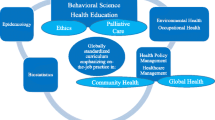Abstract
A questionnaire was developed from the goals and objectives of the first and second medical school curriculum of the University of South Carolina School of Medicine’s Department of Neuropsychiatry and Behavioral Science. Seventy-seven physicians, including psychiatrists, family practitioners and pediatricians rated the clinical relevance of the sixty-five behavioral science content areas in the questionnaire. Behavioral science areas rated very clinically relevant are discussed in terms of feedback to undergraduate medical students and in terms of potential collaborative continuing medical education for the three medical specialties used as physician raters. Also, the areas rated as minimally clinically relevant by family practitioners and pediatricians which focused on theories of human behavior suggest that the psychiatrist and behavioral scientist in medical education need to develop new approaches in order to change the view of nonpsychiatric physicians toward the theoretical aspect of human behavior.
Similar content being viewed by others
References
Stainbrook E, Wexler M: The place of the behavioral sciences in the medical schools. Psychiatry 29:263–269, 1956
Weiner H: Behavioral science courses: Their function and relevance in medical education. Arch Gen Psychiatry 4:307–315, 1961
Knopp W, Johnson EW, Derbyshire JS, et al: Planning and executing a course in human behavior and relations for first-year medical students. J Med Educ 45:160–167, 1970
Block S: Goals in the teaching of behavioral science to medical students. Br J Med Educ 7:239–243, 1973
Steele TE: Teaching behavioral sciences to medical students. Arch Gen Psychiatry 35(1):21–34, 1978
Holmes G, Donald A, Goldschmidt T: Behavioral science in medical education: An updated bibliography. Percept Mot Skills C3, 907–918, 1981
Blackwell B, Torem M: Behavioral science teaching in US medical schools: A 1980 national survey. Am J Psychiatry 139(10):1304–1307, 1982
Gutnik BD, Haffke EA, Strider FD: Behavioral science texts in US medical schools. J Psychiat Educ 6(2):67–73, 1982
Haffke, EA, Strider FD, Gutnik BD: Content survey of behavioral science courses. J Psychiat Educ 8(3): 158–164, 1984
Donald A, Holmes G, Goldschmidt T: Content categories of behavioral science questions at nine medical schools. J Psychiat Educ 6(4):193–199, 1982
Callen KE: Psychiatric education of nonpsychiatrists: Is it relevant to medical practice. Psychosomatics 22:43–54, 1980
Brooks CM, Beaton JM, Maisiah R: Using NBME subject examination as a pretest to identify medical students “at risk” in a behavioral science course. J Psychiat Educ 6(2):101–106, 1982
Keegan DL, Spooner HJ: Teaching psychological aspects of medical practice in Canadian undergraduate medical curricula. J Psychiat Educ 8(3): 179–186, 1984
Golding R, Carr V, Katsikitis M: Assessment of the delineation of psycho-pathology by medical students. J Psychiat Educ 7(3):202–207, 1983
Duncan RL, West DA: Developmental boxes: A new tool for teaching the human life cycle. J Psychiat Educ 8(1):30–35, 1984
Arnold LE, Calestro K, Bates WJ, Wasserman M: Teaching psychiatric interviewing as a core physician skill. J Psychiat Educ 7(3): 102–112, 1983
Beck RL: Family psychiatry and the medical student: The marital and family assessment seminars. J Psychiat Educ 6(2):94–100, 1982
Johnson AH, Fisher JV, Guy LJ, et al: Developing behavioral science for a family practice residency. J Fam Prac 4(2):319–324, 1977
Kosch SG, Dallmann JJ: Essential areas for behavioral science training: A needs assessment approach. J Med Educ 58:619–625, 1983
Reister GE, Boulger JG: Practicing physician’s judgments of curriculum content in the behavioral sciences. J Med Educ 47:729–736, 1972
Author information
Authors and Affiliations
Additional information
Support for this research was provided by NIMH Grant Number 5 TO 1 MH14370.
Rights and permissions
About this article
Cite this article
Holmes, G.A., Burch, E.A., Wright, H.H. et al. Evaluation of a Behavioral Science Curriculum by Psychiatrists, Family Practitioners and Pediatricians. Acad Psychiatry 10, 228–234 (1986). https://doi.org/10.1007/BF03399965
Published:
Issue Date:
DOI: https://doi.org/10.1007/BF03399965



